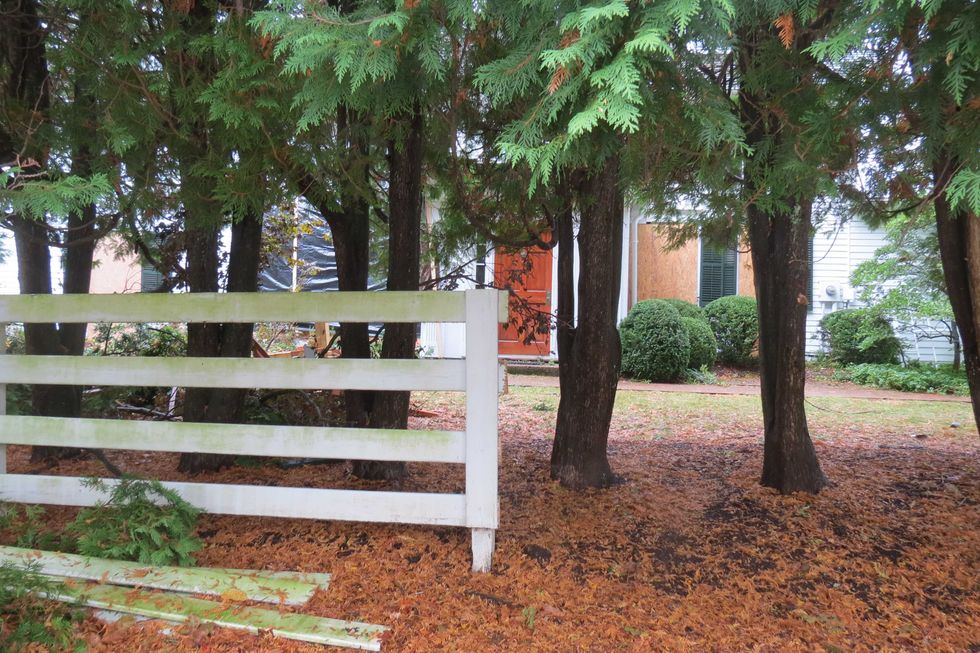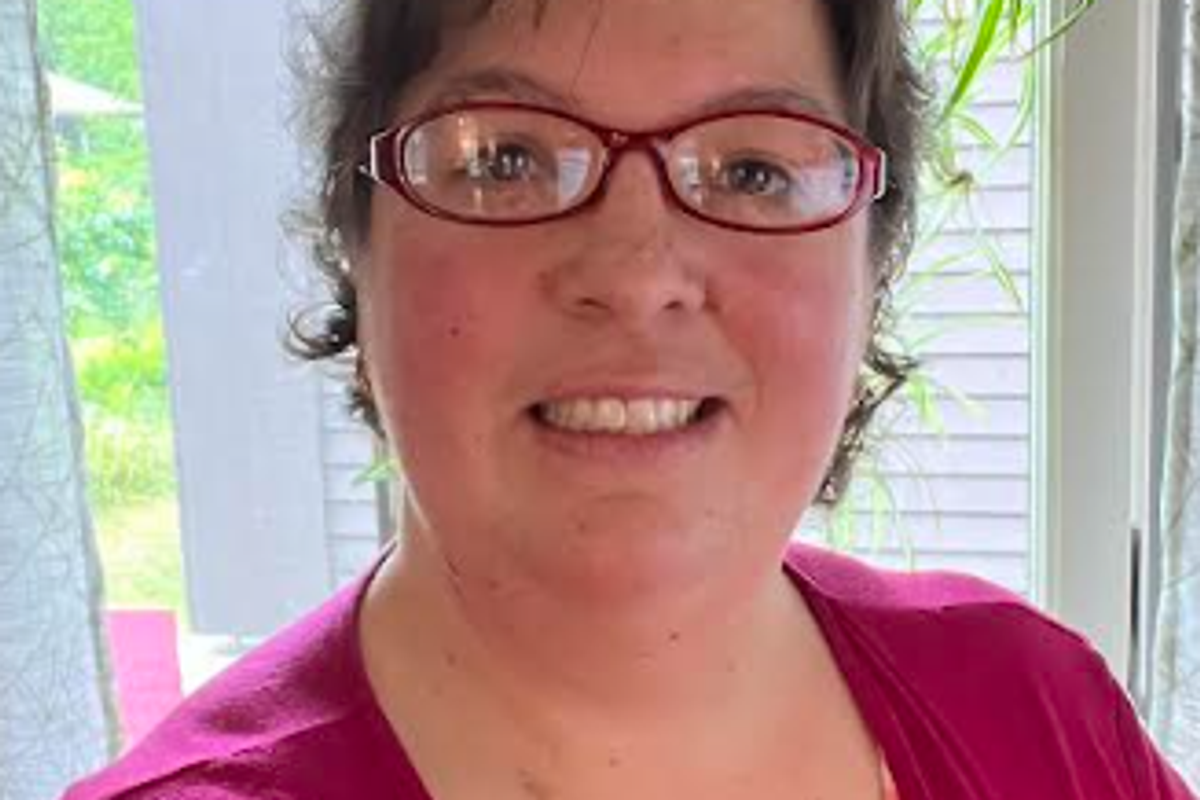Latest News
Fallen tree cancels jubilee
Oct 13, 2025
The roof of the Grove was damaged by the tree, the event tent was punctured, a chef was injured and the Jubilee Luncheon was canceled Sunday, Oct. 12.
Photo by Patrick L. Sullivan
LAKEVILLE — The Lakeville Journal and The Millerton News Jubilee Luncheon fundraiser at the Grove Sunday, Oct. 12 was canceled after a very large section of a tree fell on the caterer’s tent at about 10 a.m.
Most of the catering staff heard the tree breaking up and got out of the tent in time, but the chef was hit by the falling limbs and sustained non-critical injuries.
A portion of the Grove’s roof sustained damage and branches came through the tent.
The Lakeville Hose Company responded to the scene. The chef was transported to Sharon Hospital by the Salisbury Volunteer Ambulance Service.
“While we’re deeply disappointed to cancel our annual fundraising event, our first concern is for our caterer’s chef, who was injured in the incident and is now recovering at home,” said James Clark, Publisher. “We’re grateful there were no more serious injuries, and we deeply appreciate the understanding and support of our honoree, underwriters, and guests.”
The incident occurred during preparation for the event, which would have centered around the presentation of the Estabrook Community Leadership Award to Bunny Williams.
Food that The Marketplace had prepared for the event was donated to People’s Pantry in Great Barrington.
Keep ReadingShow less
Emergency responders block Amenia Union Road in Sharon Saturday, Oct. 11, while responding to the vehicle crash.
Photo by Patrick L. Sullivan
Updated Oct. 13, 9:25 a.m.:
SHARON — Shea Cassidy-Teti, 17, of Salisbury, died Saturday, Oct. 11, in a tragic car crash on Amenia Union Road in Sharon.
Connecticut State Police reported Charles Teti, 62, was driving his Jeep Grand Cherokee northbound on Amenia Union Road when, for an unknown reason, the vehicle crossed the southbound lane and exited the roadway where it struck a tree and home. Airbags deployed.
Teti and front seat passenger Aidan Cassidy, 63, sustained serious injuries. Teti was airlifted to Hartford Hospital and Cassidy was transported by ambulance to Sharon Hospital for treatment.
Shea Cassidy-Teti was in the back seat and sustained fatal injuries. He was pronounced dead on scene.
Cassidy-Teti was a senior at Kent School. He played on the football and tennis teams.
The residence that was struck is located at 35 Amenia Union Road.
The case remains under open investigation. Witnesses are asked to contact Trooper Lukas Gryniuk at Troop B 860-626-1821.

Keep ReadingShow less
Rhys V. Bowen
Oct 08, 2025
LAKEVILLE — Rhys V. Bowen, 65, of Foxboro, Massachusetts, died unexpectedly in his sleep on Sept. 15, 2025. Rhys was born in Sharon, Connecticut, on April 9, 1960 to Anne H. Bowen and the late John G. Bowen. His brother, David, died in 1979.
Rhys grew up at The Hotchkiss School in Lakeville, where his father taught English. Attending Hotchkiss, Rhys excelled in academics and played soccer, basketball, and baseball. During these years, he also learned the challenges and joys of running, and continued to run at least 50 miles a week, until the day he died.
In 1982 after graduating summa cum laude from Harvard College, Rhys returned to Hotchkiss to teach biology, where he met his wife of 35 years, Rebecca (Becky) Snow. After two years of teaching, he worked at a research field site in Borneo, then went on to the University of California, Davis where he earned a PhD in Animal Behavior in 1995.
Rather than follow an academic tenure track, Rhys preferred the solitary focus of field ornithology, and he spent several decades researching the ecology of bird species in California and on Cape Cod and the Islands. Rhys believed passionately in supporting biodiversity through habitat preservation. His proudest achievements, therefore, came through his work for the Lakes Region Conservation Trust, in New Hampshire, where he served on committees and the Board of Trustees for twenty years, including three years as Chair.
Deeply intellectual and curious, Rhys learned Homeric Greek so he could read The Odyssey and The Iliad in their original language. An amateur Melville scholar, he would wax poetic about reading Moby-Dick for the umpteenth time.Rhys’s spirit was filled by the performing arts. Concerts by the Handel and Haydn Society and Boston Early Music Festival often brought tears to his eyes, while Boston Bluegrass Union shows delivered toe-tapping fidgetiness.
Rhys will be missed by his wife, Becky Snow, his mother, Anne Bowen, extended family, friends, and anyone who had the pleasure of knowing him.
A service will be held at The Hotchkiss School chapel on Saturday, Nov. 15, 2025 at 1 p.m..
In honor of Rhys’s memory, donations can be made to the Lakes Region Conservation Trust.
Keep ReadingShow less
Kelsey K. Horton
Oct 08, 2025
LAKEVILLE — Kelsey K. Horton, 43, a lifelong area resident, died peacefully on Saturday, Sept. 27, 2025, at Norwalk Hospital in Norwalk, Connecticut, following a courageous battle with cancer. Kelsey worked as a certified nursing assistant and administrative assistant at Noble Horizons in Salisbury, from 1999 until 2024, where she was a very respected and loved member of their nursing and administrative staff.
Born Oct. 4, 1981, in Sharon, she was the daughter of W. Craig Kellogg of Southern Pines, North Carolina, and JoAnne (Lukens) Tuncy and her husband Donald of Millerton, New York. Kelsey graduated with the class of 1999 from Webutuck High School in Amenia and from BOCES in 1999 with a certificate from the CNA program as well. She was a longtime member of the Lakeville United Methodist Church in Lakeville. On Oct. 11, 2003, in Poughkeepsie, New York, she married James Horton. Jimmy survives at home in Lakeville. Kelsey loved camping every summer at Waubeeka Family Campground in Copake, and she volunteered as a cheer coach for A.R.C. Cheerleading for many years. Kelsey also enjoyed hiking and gardening in her spare time and spending time with her loving family and many dear friends.
In addition to her husband and parents, Kelsey is survived by her two beloved children, Hunter Horton and Aryanna Horton, both of Lakeville; a step-brother, Jason Tuncy of East Hartford, Connecticut; her mother-in-law, Frances “Fran” Horton and her brother-in-law, Benjamin D. Horton III and his wife Penny of Bloomsburg, Pennsylvania, and their son, Alec, and several aunts, uncles, cousins and many dear friends. She was predeceased by her father-in-law, Benjamin D. Horton, Jr. in 2017.
There are no calling hours. A Celebration of Life will take place on Saturday, Oct. 25, 2025, from 11 a.m. to 2:00 p.m. at the Millerton American Legion Post # 178, Route 44, Millerton, NY 12546. A time to celebrate Kelsey and share stories and memories. Memorial contributions may be made to The Jane Lloyd Fund. Please make checks payable to Berkshire Taconic Community Foundation (please note in memo line, The Jane Lloyd Fund) and mail to: Berkshire Taconic Community Foundation, 800 N. Main Street, Sheffield, MA 01257.
To send an online condolence to the family, flowers to the service or to plant a tree in Kelsey’s memory, please visit www.conklinfuneralhome.com
Arrangements have been entrusted to the Scott D. Conklin Funeral Home, 37 Park Avenue, Millerton, NY 12546.
Keep ReadingShow less
loading









